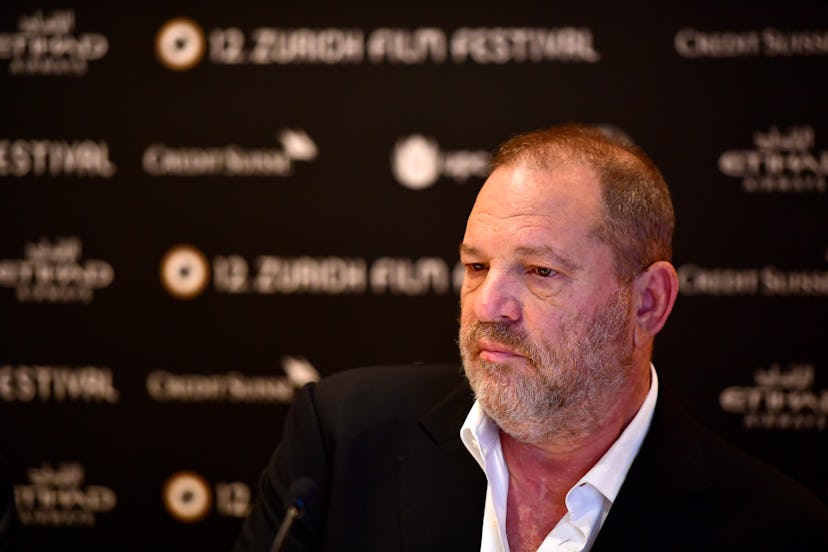Harvey Weinstein Accused of Sexual Harassment, Defends Himself with Fake Jay Z Lyric
Ashley Judd and Rose McGowan are the two most high profile women accusing the film mogul of a history of sexual harassment, but the allegations go back decades.

Harvey Weinstein may have rewritten the rules of Hollywood awards season, but the powerful mogul seems to have exemplified the horrid old rules of Hollywood’s abusive boys club. In a blockbuster new report, New York Times reporters Jodi Kantor and Megan Twohey meticulously chronicled decades of sexual harassment claims made against Weinstein that until now had been kept under wraps. According to the claims, Weinstein had a habit of taking meetings with young actresses and female employees in his hotel suites, often while he was wearing just a bathrobe. The multiple sources, often on the record, also claim he would often brag about all the actresses he had slept with and suggested or forced massages upon female underlings. Actress Ashley Judd claims that in the ’90s, Weinstein once invited her to watch him shower.
Weinstein already cut an infamous figure in Hollywood. Founding Miramax as an independent film distribution company with his brother Bob in the late ’70s, Weinstein would become one of Hollywood’s hottest executives by the late ’80s with a string unlikely hits (both at the box office and on the awards circuit) including Stephen Soderbergh’s Sex, Lies and Videotape and My Left Foot, which would win Daniel Day-Lewis his first Oscar. By the time Miramax was bought by Disney in 1993, Weinstein already had a reputation for being able to single handily propel talent, both directors and actors, to the A-List out of obscurity. Pulp Fiction, Clerks, The Piano, Kids, Swingers and more were all Miramax films (the Weinsteins have since left Miramax and now run The Weinstein Company, which still deals in prestige fare—The King’s Speech, 2011’s Best Picture winner at the Oscars, was theirs).
As Judd tells the Times, his business reputation was reason enough for any young actress to agree to a meeting. She quickly realized she was in for more than she bargained with when she realized the meeting would be held in his hotel room. From The Times:
Mr. Weinstein soon issued invitation after invitation, she said. Could he give her a massage? When she refused, he suggested a shoulder rub. She rejected that too, she recalled. He steered her toward a closet, asking her to help pick out his clothing for the day, and then toward the bathroom. Would she watch him take a shower? she remembered him saying.
“I said no, a lot of ways, a lot of times, and he always came back at me with some new ask,” Ms. Judd said. “It was all this bargaining, this coercive bargaining.”
To get out of the room, she said, she quipped that if Mr. Weinstein wanted to touch her, she would first have to win an Oscar in one of his movies. She recalled feeling “panicky, trapped,” she said in the interview. “There’s a lot on the line, the cachet that came with Miramax.”
The Times also confirmed that Weinstein reached a $100,000 settlement with actress Rose McGowan in 1997, when she was 23 years old, after an incident in a hotel room during the Sundance Film Festival. McGowan has spoken publicly about being the victim of sexual misconduct in Hollywood, but has stopped shy of naming names. She did not comment to the Times on the settlement.
Though, it wasn’t just actresses that Weinstein harassed, but young women who worked directly for him at both Miramax and The Weinstein Company.
“In interviews, eight women described varying behavior by Mr. Weinstein: appearing nearly or fully naked in front of them, requiring them to be present while he bathed or repeatedly asking for a massage or initiating one himself,” reports The Times. “The women, typically in their early or mid-20s and hoping to get a toehold in the film industry, said he could switch course quickly — meetings and clipboards one moment, intimate comments the next. One woman advised a peer to wear a parka when summoned for duty as a layer of protection against unwelcome advances.”
In a Jay Z lyric-quoting statement released to the newspaper, Weinstein claims that he didn’t know better and is now seeking counseling. He was also take a leave of absence from his company.
“I realized some time age that I needed to be a better person and my interactions with the people I work work with have changed,” it reads in part. “I appreciate the way I’ve behaved with colleagues in the past has caused a lot of pain, and I sincerely apologize for it.”
“Jay Z wrote in 4:44 ‘I’m not the man I thought I was and I better be that man for my children.’ The same is true for me,” he writes in another. That quote, as Spin pointed out, does not exist anywhere in the album.
Weinstein also notably lawyered up in anticipation for the release of the report. His attorney team includes Lisa Bloom, the woman who incidentally represented many of the woman who brought sexual abuse claims against Bill O’Reilly (the rights to Bloom’s book Suspicion Nation were bought by the Weinstein Company earlier this year. Jay Z, incidentally, is set to co-produce). Variety reports another Weinstein attorney, Charles Harder, the man behind Hulk Hogan’s Gawker lawsuit, disputes the Times report and plans to sue for defamation.
Though, this may just be the beginning. The New Yorker is also said to be working on a separate article detailing the mogul’s history of harassment.
See What’s Trending in W Video: